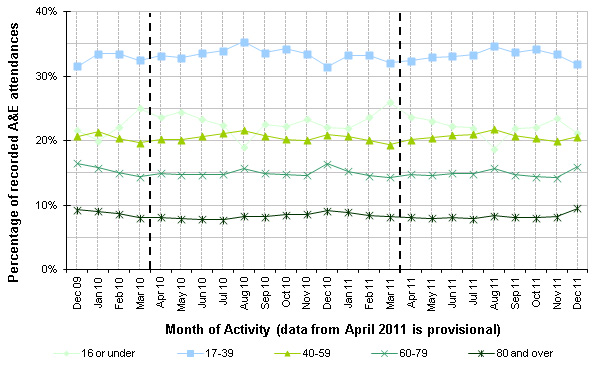IN THIS SITE...

Provisional1 Monthly HES data for Accident and Emergency (Experimental Data)
This is the most recent publication of provisional1 monthly Accident and Emergency Hospital Episode Statistics (A&E; HES) data for NHS Hospitals in England. Further details about the publication of monthly HES are in the 'about monthly HES data' document which can be found under the Related Documents.
The official source of A&E; data is QMAE (Quarterly Monitoring of Accident and Emergency)2 . There are definitional differences between A&E; HES data and QMAE data; in particular QMAE data does not include attendances where the A&E; appointment has been pre-arranged or planned whereas the HES data does. QMAE remains the official source of A&E; attendance and four-hour wait figures.
A&E; HES data is experimental and coverage remains incomplete. It is, however, able to provide more detailed and further information about recorded A&E; attendances. The number of recorded attendances in 2010-11 A&E; HES has increased by 5% since 2009-10, compared to a 4% increase in 2010-11 QMAE attendances. Therefore, caution should be used when comparing years, as increases are more likely to be a reflection of improvements in coverage, rather than actual increases in attendances.
Key facts
In the year from January 2011 to December 2011 there were:
- 16.9 million A&E; attendances3 recorded in A&E; HES. Of these 3.6 million (21.3%) resulted in admission to hospital for inpatient treatment, 3.2 million (19.2%) resulted in a GP follow up, and 6.6 million (38.8%) were discharged with no follow up.
Percentage of recorded A&E; attendances1 each month by age group
 |
| Number of A&E; attendances3 by method of discharge: Rolling 12 month period comparison | |||
|---|---|---|---|
| Jan 2010 to Dec 2010 | Jan 2011 to Dec 2011 | Growth / Improvement in coverage | |
| Total | 15,975,912 | 16,931,358 | 6.0% |
| Admitted / became a lodged patient4 | 3,523,912 | 3,608,959 | 2.4% |
| Discharged - GP follow up5 | 2,972,835 | 3,245,119 | 9.2% |
| Discharged - no follow up5 | 6,163,759 | 6,563,082 | 6.5% |
| Referred6 | 2,129,816 | 2,209,740 | 3.8% |
| Others | 1,185,590 | 1,304,458 | 10.0% |
| Number of A&E; attendances3 by method of discharge: Year-to-date comparison | |||
|---|---|---|---|
| Apr 10 to Dec 10 | Apr 11 to Dec 11 | Growth / Improvement in coverage | |
| Total | 12,300,290 | 12,986,714 | 5.6% |
| Admitted / became a lodged patient4 | 2,666,544 | 2,710,146 | 1.6% |
| Discharged - GP follow up5 | 2,296,195 | 2,485,453 | 8.2% |
| Discharged - no follow up5 | 4,765,402 | 5,062,056 | 6.2% |
| Referred6 | 1,634,558 | 1,708,517 | 4.5% |
| Others | 937,591 | 1,020,542 | 8.8% |
Footnotes
1. Provisional data: The data is provisional and may be incomplete or contain errors for which no adjustments have yet been made. Counts produced from provisional data are likely to be lower than those generated for the same period in the final dataset. This shortfall will be most pronounced in the final month of the latest period, e.g. November from the (month 9) April to November extract. It is also probable that clinical data are not complete, which may in particular affect the last two months of any given period. There may also be errors due to coding inconsistencies that have not yet been investigated and corrected.
2. Accident and Emergency Quarterly Monitoring Data Set (QMAE): The Accident and Emergency Quarterly Monitoring Data Set (QMAE) is a provider based return not a commissioning return. A Primary Care Trust should only complete the return for the services it provides, not those it commissions from local NHS Trusts. Examples of services provided could be a minor injury unit or NHS walk-in centre managed by the Primary Care Trust. This data is collated by the Department of Health and further information is available here.
3. A&E; attendances: A&E; Attendances in HES, relates to the number of recorded attendances. A&E; attendances do not represent the number of patients, as a person may have more than one admission within the year. Provisional HES A&E; figures include planned follow up attendances.
4. Admitted became a Lodged Patient: A PATIENT temporarily accommodated in an Accident and Emergency Department or elsewhere for whom a DECISION TO ADMIT has been made; but who remains waiting in the nursing care of the Accident and Emergency Department for longer than is appropriate for his/her condition before moving to a WARD.(Description taken from Connecting for Health website)
5. Discharged:Discharged - GP follow up = Discharged from A & E case load to the GP for further assessment or treatmentDischarged - no follow up = Discharged without any follow-up, meaning that patient does not need any further advice or treatment and is discharged from A & E's caseload and any other care provider for the originating medical condition.
6. Referred: The patient is advised to seek medical care under another care provider, which maybe a Dentist, GP, in hospital Medical consultant (Main Speciality), Surgical consultant, Social Services, or referred to another A & E x-Ray department.
A&E; data quality: Accident and Emergency Hospital Episode Statistics (A&E; HES) are compiled from data submitted by more than 160 NHS trusts and primary care trusts (PCTs) in England. The NHS Information Centre for health and social care liaises closely with these organisations to encourage submission of complete and valid data and seeks to minimise inaccuracies. While this brings about improvement over time, some shortcomings remain.
Source statement: Source: Hospital Episode Statistics (HES), The Health and Social Care Information Centre.
Responsible statistician
The responsible statistician for this publication is Chris Dew, HES/SUS Analysis (Service) Section Head ([email protected], 0845 300 6016).
Copyright statement
The copyright to the information we are disclosing is held by the Health and Social Care Information Centre. The HSCIC has suspended the application of re-use licence fees as a consequence of government policy ('Making Public Data Public'), so you may re-use this information free of charge. Please ensure that the following copyright statement is included within your documents: 'Copyright � 2012 Re-used with the permission of the Health and Social Care Information Centre. All rights reserved.' Please also use the citation logo available for download from the HSCIC's website.

